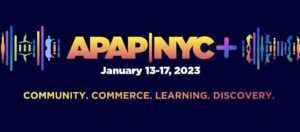 More than 2,700 performing arts professionals from throughout North America and beyond converged on New York City, Jan. 13-17, 2023 for the annual conference of the Association of Performing Arts Professionals (APAP) – its first in-person gathering in several years due to the COVID-19 pandemic. As in years past, dozens of performers from the folk, roots and singer-songwriter communities were featured among the more than 1,000 showcases during the global multidisciplinary performing arts marketplace and conference.
More than 2,700 performing arts professionals from throughout North America and beyond converged on New York City, Jan. 13-17, 2023 for the annual conference of the Association of Performing Arts Professionals (APAP) – its first in-person gathering in several years due to the COVID-19 pandemic. As in years past, dozens of performers from the folk, roots and singer-songwriter communities were featured among the more than 1,000 showcases during the global multidisciplinary performing arts marketplace and conference.
A number of booking agencies whose rosters include such artists were among the more than 300 exhibitors in the large EXPO Hall. The conference also featured networking opportunities galore, streamlined array of professional development workshops, peer group sessions, and networking opportunities galore.
Since the last in-person APAP conference in NYC in January 2020, the impacts of the pandemic; calls for racial equity, diversity and inclusion; and a shifting economy and workforce continue to have a major impact on the performing arts industry as it seeks to recover and reimagine itself.
For Lisa Richards Toney, who joined APAP as its president and CEO in 2020, the 2023 gathering also marked the first in-person conference of her tenure. As she noted in an email to members and colleagues last November, the conference has evolved to meet the shifting nature of the field and the times we live in. “None of this has been easy. In fact,it’s been downright hard,” she acknowledged during the conference’s opening plenary session. In welcoming people to what she called “the creative capital of the world,” Richards Toney said “We are a resilient community of colleagues from all across North America” and expressed excitement at “the feverish fury to reignite business [in the performing arts].”
APAP embraced the ‘less is more’ philosophy — with considerably fewer professional development sessions during the 2023 conference than in previous years in light of its increased year-round programming. This afforded attendees — more than one-third of whom were first-timers — more time to connect and network with colleagues, visit the exhibit halls, enjoy showcases, and just breathe.
For the first time, APAP did not produce a printed conference program and other printed materials (or a tote bag in which to carry them), relying instead on an online platform called Swapcard that was also available as an app.
Showcases of Note Took Place at the Host Hotel and at Venues Around NYC
Showcases took place both at the New York Hilton Midtown, the conference hotel, and at venues throughout Manhattan. A few also were set in other New York City boroughs and beyond.
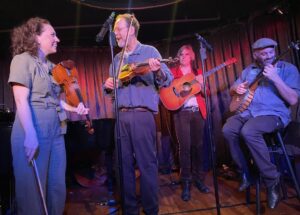
Ken Waldman (second from left) showcased his talents, along with Caitlin Warbelow, Jefferson Hamer and Ilan Moss, among others, during a roots music variety show. (iPhone Photo: Michael Kornfeld)
“When I talk to presenters, I sometimes tell them I always strive for events that are win/win/win and are successful for the attendees, for the host organization and its community, and for myself and anyone joining me;” Waldman told AcousticMusic Scene.com.
So once I had my mini-preview set to open the evening with Fairbanks native and super fiddler, Caitlin Warbelow, and I playing my ‘Fairbanks Cabin Waltz’ composition, then joined by Ilan Moss on banjo and Jefferson Hammer on guitar, I had my own successful time of it. And, later, I had my couple of tunes, with poems, joined by Ilan. Fun, too, for me, and I heard positive things afterwards… I got very positive feedback from my troupe of musicians and from Danielle, so that all checked the box of ‘me and anyone joining me’.”
Waldman, who has been attending, exhibiting and mentoring at APAP conferences since 2007 and began hosting a Friday night roots music variety show three years later, said that also received very positive feedback from attendees. “One attendee emailed me during the evening to say how much they were enjoying it. Another told me later how inspired they were from being introduced to such a wide range of musicians that were different, yet all fit together.” However, he said that his favorite response came from someone who arrived the earliest, said they were tired and would probably only stay for a half hour, and stayed for the whole three hours (later informing him that they passed word about the evening to their venue’s artistic director). “A number of people stopped me through the week to either say they were there and thoroughly enjoyed it, or weren’t there but heard it was fantastic. With proper follow-up and any luck at all I’ll get work I probably wouldn’t have gotten otherwise– and I hope some also goes to the artists I invited and to Danielle’s artists.”

Danielle Devlin (Canis Major Music) is all smiles as she introduces one of the artists at Don’t Tell Mama. (iPhone Photo: Michael Kornfeld)
“The evening had a beautiful range of artists performing that included flamenco, sea shanties, masterful kora playing, jazz manouche, beautiful song and fiddle tunes, poetry … all complementing each other. One of my artists, Tamar Ilana, who was performing with Shelley Thomas on oud, came to me immediately after her opening single-song [and said] that her heart was so full from the experience and was just loving it. The energy in the room was beautiful and felt like a perfect return to an in-person APAP for all involved, I believe.”
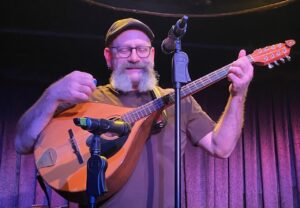
Sean Dagher performs during the roots music variety show. (iPhone Photo: Michael Kornfeld)
So three years later, he returned – having lined up two showcases for his new solo shanty show and planning to reconnect with as many of the people he had met in 2020 as possible. Dagher decided to focus less on the Expo Commons and found that the experience of showcasing changed how he interacted with people and how they interacted with him. “After the first showcase [the roots music variety show], random people came up to me to tell me that they had enjoyed my performance… I suddenly felt like less of a beggar and more of a commodity,” he said.
Dagher considered the showcase at Don’t Tell Mama to be great – “despite and because of being chaotic. I heard lots of great artists and met some fascinating people. According to Danielle Devlin, my agent and co-host of the event, I generated some interest from presenters. The venue was intimate and having the other musos there helped create a great atmosphere.”
Folquebec Shines Spotlight on Artists from the Canadian Province
Dagher also performed a short set during a Folquebec Spotlight showcase at the host hotel that he described as “an entirely different, though no-less enjoyable experience.” Comparing it to showcases he had seen and participated in at other conferences, he noted that the hotel room “had a colder feel and the lights made it hared to connect with the public, but I still had fun playing for and with them. The loud altercation between the lighting tech and the maintenance guy during my set actually helped put me at ease. Again, I felt like people were treating me with a little more respect than when I was just a delegate. I hope that I get a lot of work out of the conference, and I will definitely go back next year.”
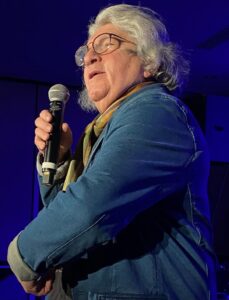
Gilles Garand served as emcee for the Folquebec Spotlight showcase at the New York Hilton Midtown. (iPhone Photo: Michael Kornfeld)
Garand previously informed AcousticMusicScene.com that Folquebec’s formation stemmed from conversations at a Folk Alliance conference in 2000 and that he views APAP and other conferences as “opportunities to share our knowledge and contribute to the concept of cultural reciprocity among artists. Through its participation in such conferences, Folquebec “looks forward to developing an ongoing partnership with leaders of North American cultural organizations to bring together our strengths, our resources, our complementaries in the advancement of the performing arts sector, and music in particular, of the broad cultural diversity of human expression through the arts,” he said.
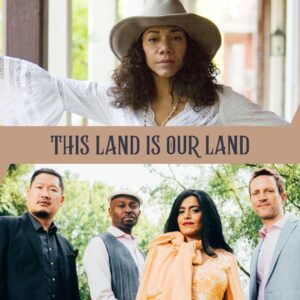
A 30-minute This Land is Our Land showcase featured Martha Redbone and American Patchwork Quartet.
The quartet’s Clay Ross (who also fronts both Matuto and Ranky Tanky) joined with composer, banjoist and producer Jayme Stone — with whom he has previously co-produced Global Routes Music Showcases — to also present an interactive, multi-part Composing Your Career professional development series of workshops for artists. [Editor’s Note: As someone who is often retained by artists and others to write bios for them, I sat in on part of one of their workshops, Tell a Better Story, Book Better Gigs and found that the information and insights that they shared pretty much conformed with mine.]
Among the other folk and roots artists who showcased their talents during the conference were two-time IBMA Entertainers of the Year Balsam Range, Colorado-based folk and Americana duo Bettman & Halpin, Colombian-Panamanian roots duo Calle Sur, bluesician Eli Cook, singer-songwriter and pianist Annie Moscow and her trio, New York-based progressive bluegrass band Nefesh Mountain, Mali Obamsawin Sextet (whose music is a blend of blues, jazz, hymns, folk songs, and native cultures), ebullient New York-based jig-rockers The Prodigals, 2022 International Blues Challenge Winner Eric Ramsey (whose fingerpicking and bottleneck slide playing really impressed this writer), and The Scooches (a band whose spirited and joyful music features an eclectic mix of Roaring ‘20s, global folk, blues, gospel, New Orleans jazz, Americana, and more). Americana-cowboy country outfit Bill & the Belles, banjoist Nora Brown with Stephanie Coleman, and balladeer Phoebe Hunt shared a Concerted Efforts Presents bill at Rockwood Music Hall during the conference. Susan Werner, a very witty and versatile singer-songwriter who accompanies herself on both guitar and piano, played Iridium, a Manhattan nightclub that primarily features jazz artists. There were also musical tributes to such artists as Joni Mitchell and Van Morrison, while Darrah Carr Dance presented “Celidh“ Irish Music & Dance and Allan Harris and others shared excerpts from Cross The River — a musical by him and Pat Harris that relates the story of an escaped slave named Blue who journeys to Texas and becomes one of the first Black Cowboys. Artists in various other musical genres also showcased their talents, while comedy, dance and theatrical showcases also were part of the mix.
About the Association of Performing Arts Professionals (APAP)
 Based in Washington, DC, APAP (apap365.org) is a nonprofit national service, advocacy and membership organization dedicated to developing and supporting robust performing arts presenting field and the professionals who work within it.
Based in Washington, DC, APAP (apap365.org) is a nonprofit national service, advocacy and membership organization dedicated to developing and supporting robust performing arts presenting field and the professionals who work within it.

Like/Follow Us!